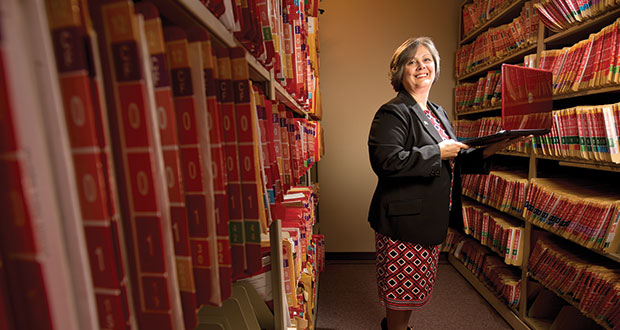State rolling forward with mandatory e-filing
By: Erika Strebel, [email protected]//July 20, 2016//

Coming soon to a county near you
E-filing will be mandatory in the following counties starting on the following dates:
Jefferson Aug. 1
Columbia Aug. 1
Adams Aug. 15
Pierce Aug. 15
Waupaca Aug. 15
Barron Sept. 1
Chippewa Sept. 1
Dunn Sept. 1
Florence Sept. 15
La Crosse Sept. 15
Judges and court staff now have quicker access to documents. Mueller estimates her clerks have cut their time opening snail mail by two-thirds. On occasion, they are sending back pleadings that lawyers in other counties mailed in rather than filed electronically.
“It’s a whole different software for the attorneys,” Mueller said. “So we had to change the process in that we are no longer the scanner — the attorney is.”
That additional responsibility for lawyers is likely to be the most noticeable change around the state as e-filing becomes mandatory in more and more counties. The rollout is deliberately being done in phases.
The first of the state’s 72 counties to have mandatory e-filing were Dodge and Ozaukee counties. Dodge County began requiring it at the start of June and Ozaukee County a month later. Although the state now only mandates e-filing of documents in civil, paternity, family and small-claims cases, Dodge and Ozaukee counties also now allow voluntary e-filing in criminal cases.
Next up in the rollout will be Jefferson and Columbia counties, which are scheduled to join Dodge and Ozaukee counties on Aug. 1. Various other counties will follow later in August and in September.
“We’re really excited about where we are now and we feel like it has gone smoother than we expected,” said Jean Bousquet, chief information officer for the state courts.
Court Consolidated Automation Programs, which tends to state courts’ technology needs, plans to spend two weeks on average in each county helping to put mandatory e-filing systems in place. CCAP will send out representatives a week before e-filing is officially scheduled to become mandatory and have them stick around a week after the start date just to make sure things are running well.
Part of the reason the transition has been smooth so far, Bousquet said, is that most attorneys are already set up with an e-filing account. Bousquet said that the accounts were needed so that lawyers would be able to report their completion of continuing-education requirements.
Also, CCAP was able to work with the courts and local bar associations to provide training before e-filing became mandatory. All this is not to say, though, that the transition has not been entirely without difficulties.
“There are always people you miss,” Bousquet said. “There are some situations that have come up and will continue to come up that we’ll have to address as we go.”
Bousquet said adopting e-filing in Dodge and Ozaukee counties helped CCAP identify and straighten out kinks in the new system. For example, CCAP is working to make sure lawyers can get signatures from a series of people without needing to scan a document in again every time it needs to be signed by someone new.
But not all the difficulties CCAP and the two counties have encountered can be dealt with so easily. For one, changes to various legal forms can’t be made without first receiving official approval. Then there are the complications that come with trying to integrate child-support agencies into the new system.

In general, the biggest difficulty courts have had preparing for mandatory e-filing has stemmed from the need to scan in often voluminous amounts of legal documents. That’s especially true if they haven’t done so already, said Marcia Vandercook, circuit court legal adviser.
Ozaukee, Dodge and 51 other counties have less to be concerned about because they have been offering voluntary e-filing to lawyers. The state, starting in 2008, began to allow voluntary e-filing in anticipation of the current mandate.
Judges and clerks in counties with voluntary e-filing have thus been preparing for years. Dodge County, for instance, has been paperless since 2015. Similarly, Ozaukee County started scanning in documents and working with electronic files in 2011 and went paperless in 2014.
“The staff wasn’t wild about it at the beginning … but then they grew to love it,” Mueller said. “It was hard to transition from working with hard copies to electronic files. But now not one of them would go back.”
Living to tell the tale
Margaret Zickhur Zolp, a Grafton attorney, suggested that lawyers and firms should prepare for mandatory e-filing by electronically filing documents in counties where e-filing is still voluntary.
That’s what her firm, Houseman & Feind, did while waiting for e-filing to become mandatory in Ozaukee County.
“It’s probably a good idea to start sooner or later,” she said. “We started two years ago and slowly implemented it into our practice so when it went live we were ahead of the learning curve.”
Another piece of advice for attorneys is to understand that the documents they file will be the only copies. Lawyers should take care that their submissions, which usually take the form of PDFs, are as readable as possible.
“Get your scanning mechanism down and make sure the court officials can trust your electronic file,” Mueller said. “This is our document forever. It has to stand the test of time and be readable and usable.”
She recommends that lawyers work closely with court clerks and is now drawing up an e-filing guide for attorneys who file in her court.
Get a jump
Clerks who haven’t yet started scanning in cases should begin as soon as possible, said Dodge County Clerk Lynn Hron.
“(Clerks and their staff) need to get used to having an electronic record as opposed to a paper file,” she said. “If you’re waiting for mandatory e-filing, you’ll have way too many issues. You need to be proactive.”
Change is coming
The cost to e-file is $20 per party per case, with exceptions for indigent parties and state, municipal and other government agencies.
Pro se litigants may still file by paper unless they submit more than 10 cases a year.
By the end of 2017, all 72 counties will require electronic filing for civil, paternity, family and small-claims cases.
Mandatory e-filing for criminal, forfeiture, and traffic cases will start in 2017.
The goal is statewide implementation of all case types by the end of 2019.
That second screen comes in handy, said Dodge County Circuit Court Judge John Storck. He uses it so he can look at more than one case at a time. When the matter before him is particularly complicated, it’s always possible to go back to using paper documents.
“The key is don’t be afraid to press print when you need it,” Storck said. “Learn how to put multiple documents on your screen at same time and learn how to manipulate those documents on your dashboard.”
One source of concern for Ozaukee County Circuit Court Judge Paul Malloy is that looking at a computer screen can take his attention away from what is happening in front of him in his courtroom.
Ozaukee County District Attorney Adam Gerol, whose office went live with the e-filing system last week, agreed. He said that although he is thrilled to be dealing with less paper, there are drawbacks to legal professionals’ spending more time on computers.
“The sad part, though, is when you walk into a courtroom,” he said. “You see people staring at a screen as opposed to looking at the judge or each other.” Follow @erikastrebel
Legal News
- Former law enforcement praise state’s response brief in Steven Avery case
- Eric Toney announces re-election bid for Fond du Lac County District Attorney
- Former Wisconsin Democratic Rep. Peter Barca announces new bid for Congress
- Republicans file lawsuit challenging Evers’s partial vetoes to literacy bill
- More human remains believed those of missing woman wash up on Milwaukee Co. beach
- Vice President Harris returning to Wisconsin for third visit this year
- Wisconsin joins Feds, dozens of states to hold airlines accountable for bad behavior
- Trump ahead of Biden in new Marquette poll
- Bankruptcy court approves Milwaukee Marriott Downtown ‘business as usual’ motion
- New Crime Gun Intelligence Center to launch in Chicago
- Arrest warrant proposed for Minocqua Brewing owner who filed Lawsuit against Town of Minocqua
- Wisconsin Supreme Court justices question how much power Legislature should have
WLJ People
- Power 30 Personal Injury Attorneys – Russell Nicolet
- Power 30 Personal Injury Attorneys – Benjamin Nicolet
- Power 30 Personal Injury Attorneys – Dustin T. Woehl
- Power 30 Personal Injury Attorneys – Katherine Metzger
- Power 30 Personal Injury Attorneys – Joseph Ryan
- Power 30 Personal Injury Attorneys – James M. Ryan
- Power 30 Personal Injury Attorneys – Dana Wachs
- Power 30 Personal Injury Attorneys – Mark L. Thomsen
- Power 30 Personal Injury Attorneys – Matthew Lein
- Power 30 Personal Injury Attorneys – Jeffrey A. Pitman
- Power 30 Personal Injury Attorneys – William Pemberton
- Power 30 Personal Injury Attorneys – Howard S. Sicula











